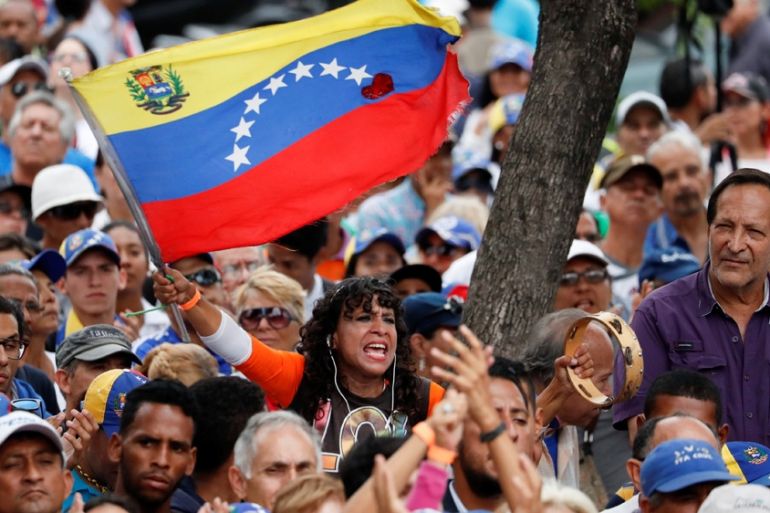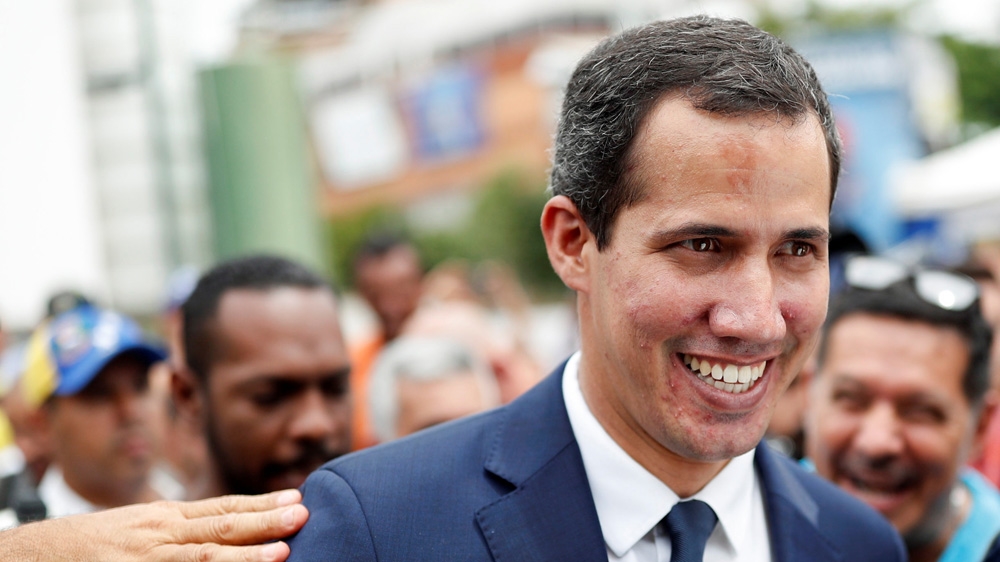Venezuela opposition rallies as blackout eases in some areas
Electricity slowly returns to some areas as Venezuela’s National Assembly approves return to US-led defence pact.

Much of Venezuela‘s capital Caracas woke up with the lights back on after the worst blackout since March knocked out power in half of the country a day earlier, although service remained down in other states and some key oil infrastructure sites were still offline.
State power company Corpoelec said on Tuesday that nine states were in the process of recovering service and power had fully returned to the capital Caracas. Tuesday’s blackout left over half of Venezuela’s 23 states in the dark.
Keep reading
list of 4 itemsVenezuela opposition figure Guaido in Colombia ahead of summit
Venezuelan court issues warrants for new opposition leaders
Venezuelan government, opposition to resume political talks
Stores closed Monday night as the lack of electricity prevented the use of credit and debit cards.
“I was hungry, and I wanted to eat,” Hernan Montalbo, a Caracas resident, told Al Jazeera.
“But there was nowhere to swipe my card because none of the machines worked, and with the financial crisis, I can’t even buy a hot dog with cash,” he added.
President Nicolas Maduro‘s government told Venezuelans not to go to work or school on Tuesday to “help the process of reconnection”.
Information Minister Jorge Rodriguez said the outage on Monday was caused by an “electromagnetic attack”. He offered no additional details or evidence.
The blackouts have increased the difficulties for many Venezuelans already dealing with widespread shortages of food and medicine and the world’s highest inflation rate.
“This situation has affected me in every way,” Alberto Pino, a Caracas resident, told Al Jazeera
“I live on the 11th floor and I didn’t have electricity, I didn’t have water, because without electricity [water] can’t be pumped, I couldn’t buy anything with a debit card, and I don’t have any cash.”
‘We have to win’
On Tuesday, opposition leader Juan Guaido, brought a relatively modest crowd of supporters on to the streets to protest against the blackouts and to mark six months since he invoked the Constitution to declare himself Venezuela’s interim president.
Guaido said that the government he calls a “dictatorship” is crumbling.
“We have to win,” he said.
The opposition-controlled National Assembly also approved a law that would allow Venezuela to return to the Inter-American Treaty of Reciprocal Assistance (TIAR).
Opposition hardliners had been pressuring Guaido to join the TIAR as a precursor to requesting a foreign military intervention to remove Maduro.
“The TIAR is not magic, it is not a button that we press and then tomorrow everything is resolved,” Guaido told a rally of supporters in Caracas. “In itself, it is not the solution – it obliges us to take to the streets with greater force to exercise our majority.”
The treaty states that an attack on one of the members – which include most large Western Hemisphere countries including the United States, Brazil and Colombia – should be considered an attack on all.
However, analysts believe that regional intervention is unlikely.
“The option of regional intervention is definitely a very remote one,” Jose Vicente Haro, a Venezuelan constitutional lawyer, told Al Jazeera.
“Even if the TIAR is recognised, the treaty recognises as a very last option, the option of regional intervention, many other legal steps need to be taken prior to that,” he added.
For others, the move was a symbolic one aimed to generate approval among supporters.
“Although many opposition supporters [dream] with the option of military intervention, the reality is that it’s not an easy move, not even for the US who is the only country capable of that,” said Javier Buenrostro, a professor at the National Autonomous University of Mexico.
“This was more of a move to generate news, than a real one,” he told Al Jazeera.

In addition to congress deputies, hundreds of other people attended the opposition rally on Tuesday, a far smaller crowd than the throngs that poured into the streets in January when Guaido declared himself interim president and that Maduro’s 2018 re-election was a sham. Dozens of Western countries, including the US, have thrown their support behind Guaido.
Some activists said the turnout was low because public transport was not available, though opposition demonstrations in Caracas have diminished in size over several months.
In January, expectations of change were high among many Venezuelans, but six months later Maduro remains in power, maintaining the support of Russia, Cuba, China and Venezuelan military leaders.
“The sympathy and the enthusiasm that the opposition generated in January has been fading,” Buenrostro said.
“The reality is Maduro still has support, including the army support, Guaido thought the army was going to turn its back, but that only showed the lack of knowledge he has of the army and of his own country,” he added.
With additional reporting by Elizabeth Melimopoulos.